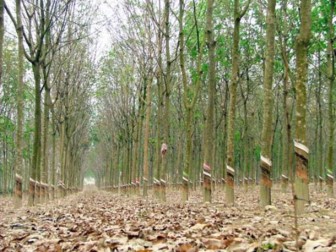 * SIR20 at 128.50 to 128.75 cents/lb, SMR20 at $2.91/kg
* SIR20 at 128.50 to 128.75 cents/lb, SMR20 at $2.91/kg
* China seen buying rubber from domestic market
SINGAPORE, Dec 12 (Reuters) – A few cargoes of tyre grades from Thailand, Indonesia and Malaysia were traded for nearby delivery this week, but main consumer China showed little interest in the commodity because of rising inventory, dealers said on Wednesday.
Thai RSS3 was sold at $3.04 to $3.05 a kg for February shipment in a series of overnight deals, slightly higher than last week’s $3.0 to $3.01. Another Thai grade, STR20, changed hands at $2.89 to $2.90 free-on-board, versus $2.92 to $2.93 including freight last week.
“China is not really chasing the market. There’s no point for them to do it because there’s so much rubber in China,” said a dealer in southern Thailand, adding that the STR20 grade was mostly sold among trading houses.
“I would think it won’t be a surprise to see stocks at Qingdao at 300,000 tonnes, including compound and synthetic rubber. But I can’t verify that.” Inventory in the Qingdao bonded area, which normally stands at around 200,000 tonnes, is not disclosed to the public, but makes up the bulk of China’s rubber stocks.
On the other hand, rubber inventories in warehouses monitored by the Shanghai Futures Exchange rose 1.8 percent to 94,796 tonnes last Friday, the exchange said in its update, the highest since early 2010.
China consumes 35 percent of the world’s rubber supply, making it the No.1 user of the commodity. It imported 2.10 million tonnes of natural rubber in 2011, up nearly 13 percent on the year, mainly from Thailand, Malaysia and Indonesia.
In other grades, Indonesia’s SIR20 was sold to Singapore dealers at 128.50 to 128.75 U.S. cents a pound ($2.83 to $2.84 a kg) for January delivery, unchanged from last week.
Malaysia’s SMR20 was traded at $2.91 a kg for February, down from $2.94 last week, partly because of concerns over demand.
“Warehouse cargo has been offered at $2.90 in Qingdao. The high stocks in China are a stumbling block. They won’t buy aggressively from the origins,” said a dealer in Kuala Lumpur.
“The price at origin is much higher.” The price of RSS3, the benchmark physical grade in Southeast Asia, has more than halved since hitting a record high of $6.40 in February 2011, hurt by concerns about weak demand due to the global economic problems, particularly Europe’s long-running debt crisis.
Thailand, Indonesia and Malaysia have agreed to keep up a policy of cutting exports, but see no need for additional steps to support prices, a senior Thai government official said on Wednesday.
In a bid to prop up prices, now standing at less than half of a record high attained in February 2011, Thailand, Indonesia and Malaysia agreed in August to cut exports by 300,000 tonnes.
They started cutting exports from Oct. 1, in a plan that runs through the end of March.
(Editing by Miral Fahmy)
Source: Reuters



























